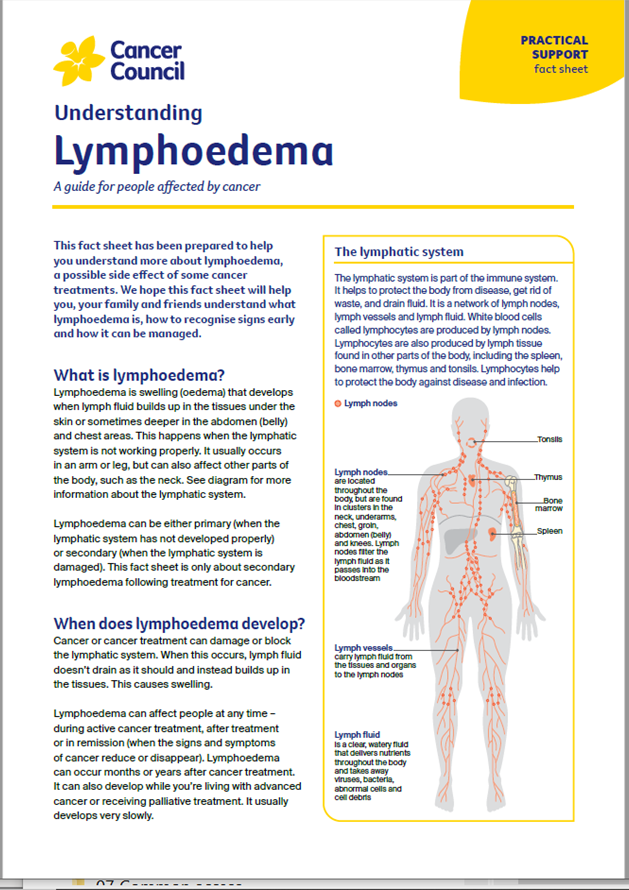- Home
- About Cancer
- Managing side effects
- Lymphoedema
- Diagnosis
Diagnosing lymphoedema
Your lymphoedema practitioner or another health professional will ask about your medical history, and check the level of swelling and any pitting, thickening or damage to the skin.
Learn more about:
Overview
The size of the affected limb will be compared to the other limb, and any differences will be assessed. This is done in different ways:
- using a tape measure to measure the distance around the limb (circumference)
- using a device with a painless, low-frequency electric charge (bioimpedance spectroscopy) to calculate the amount of fluid
- using a high-frequency, low-power electromagnetic wave to measure the water content of the tissues
- taking photos of more difficult to measure areas, such as the head, neck, trunk, breast and genitals
- using a doppler ultrasound to rule out a blood clot
- less commonly, using magnetic resonance imaging (MRI), computerised tomography (CT) or an ultrasound to show extra fluid or fat in tissues or tissue changes
- using special imaging procedures – such as lymphoscintigraphy or indocyanine green (ICG) fluorescent lymphography – to see if there are problems with lymph fluid flow.
If lymphoedema is diagnosed, it will be staged from 0 (least severe) to 3 (most severe). All stages of lymphoedema need ongoing treatment and care.
Who will provide treatment?
Lymphoedema usually requires care from a range of health professionals including a qualified lymphoedema practitioner, doctors and allied health professionals (e.g. dietitian, exercise physiologist).
| Lymphoedema practitioners | may be an occupational therapist, physiotherapist, massage therapist (may be called a myotherapist), podiatrist, speech therapist or nurse with specialist training in managing lymphoedema. Lymphoedema practitioners assess people with lymphoedema, develop treatment plans, prescribe compression garments, and provide ongoing treatment and care. They may work as part of a lymphoedema service in a public hospital or in private practice. |
| Doctors | your general practitioner (GP), surgeon or oncologist may diagnose the condition, coordinate your treatment plan and refer you to a lymphoedema practitioner. If you develop a skin infection (cellulitis), your GP will help to manage this. |
How to find a lymphoedema practitioner
You can ask your GP or specialist to refer you to a lymphoedema practitioner for assessment, or you may find a practitioner yourself. The Australasian Lymphology Association has an online register of lymphoedema practitioners. If you live in a rural or regional area, you may need to travel to visit a lymphoedema practitioner or some clinics provide telehealth consultations.
→ READ MORE: Lymphoedema treatment and management
Podcast: Coping with a Cancer Diagnosis
Listen to more of our podcast for people affected by cancer
More resources
A/Prof Louise Koelmeyer, Director, Australian Lymphoedema Education, Research and Treatment (ALERT) Program, and Associate Professor, Macquarie University, NSW; Prof John Boyages AM, Founding Director and Honorary Professor at the ALERT Program, Macquarie University, NSW; Dr Nicola Fearn, Occupational Therapist and Accredited Lymphoedema Therapist, The Lymphoedema Clinic Wollongong, and Senior Research Officer, St Vincent’s Hospital Sydney, NSW; Jennifer Gilbert, Clinical Nurse Consultant – Lymphoedema, Icon Cancer Centre, Chermside, QLD; Megan Howard, Senior Physiotherapist and Lymphoedema Physiotherapist, Peter MacCallum Cancer Centre, VIC; Caitriona Nienaber, 13 11 20 Consultant, Cancer Council WA; Dr Amanda Pigott, Clinical Specialist Occupational Therapy, Princess Alexandra Hospital, QLD; Prof Neil Piller, Director, Lymphoedema Clinical Research Unit, College of Medicine and Public Health, Flinders University, SA, and Patron, Lymphoedema Association of Australia; Ashlynne Pointon, Consumer; Dr Cathie Poliness, Breast Surgeon, Peter MacCallum Cancer Centre, VIC; Tara Redemski, Senior Physiotherapist – Cancer and Blood Disorders, Gold Coast University Hospital, QLD.
View the Cancer Council NSW editorial policy.
View all publications or call 13 11 20 for free printed copies.

